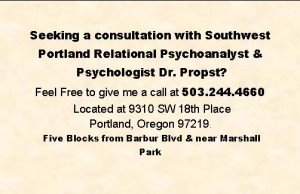Emotional intelligence means the ability to monitor and understand both one’s own and other’s feelings and emotions, to clearly understand who feels what, and to use that information to guide one’s own feelings and actions. The emotionally intelligent individually is aware of her own feelings, and those of others, and she is able to use her own emotional communications in an effective strategy-driven way.
The emotionally intelligent person does not get stuck in the following mental and emotional traps:
“When something goes wrong between us, it is always me.”
“When someone is angry at me, I feel terrible, like a horrible slug.”
“When someone ignores me, I work harder to please them.”
“I can’t say no. I am afraid I will hurt the other person.”
“The other person or the work environment is to blame for all of my problems.”
“I am totally to blame for all the difficulties I am having at work.”
“When someone looks uncomfortable, I mind-read and assume they do not like me.”
“I usually assume that everyone in the audience is critical of me.”
A clear understanding of exactly whether the causes of interpersonal difficulties are internal or external is essential for good emotional intelligence. There are many reasons that individuals may have difficulties distinguishing the reasons for difficulties in any particularly relationship. One reason is that he or she was taught by either parents or other significant figures in his or her life that he or she was usually to blame for problems she encountered with others. This person still believes that, and such over-claiming of responsibility in relationships is usually accompanied by self-criticism and/or low self-esteem. Over-claiming blame is often an automatic response in situations. A second reason for confusion as to what is me and what is you is that somehow, developmentally, this individual never learned to really see the other person, or to really understand the other’s motivations or behaviors. He or she somehow got locked inside of himself. Often this occurs as a result of insufficient attunement of significant others in the early years. An unawareness of oneself results in confusion as to where he or she stops and where the other person starts in relationships. This individual is unsure whether the feelings present are hers or the other person’s.
A third reason for such you-me confusion is the presence of emotional trauma, either early in life, or in subsequent situations. Trauma can result from emotional or physical abuse, war, accidents, or extremely stressful harsh emotional situations. Trauma is on a continuum. Individuals can be traumatized without the presence of a full-blown harsh environment such as war.
When things became too much during the original trauma, persons shut down emotionally, resulting in a lack of awareness of one’s own experiences. This lack of awareness leads to self-other confusion as indicated above. Is it me, or is it you that is the problem may not even be considered.
A safe therapeutic relationship provides the avenue to again gradually access these emotions and make them available for healthy relationships in the present.
A final reasons for me-you confusion is our vulnerability to being a prisoner of one’s own empathy. In contrast to being unaware of the other, one may be too aware of the other person, concentrating all one’s attention on what the other may be feeling or thinking. Not only does this result in loss of self in these situations, but assertion, or the healthy expression of anger become more difficult.
Finally, persons may be trapped as prisoners of their empathy because of inter-personal anxiety. They learned early on to carefully watch others so as to avoid their hostility or displeasing them. They want to protect themselves.
Me-You confusion can result in difficulty with anger. If we can not clearly see how the other person is impacting us, we may not recognize that they are doing something that is insulting or belittling. Such a lack of awareness makes one more vulnerable to abuse.
Emotional re-education that occurs in relational psychoanalysis can bring a clearer sense of differentiation between us and the other person. This emotional re-education process helps us to be more aware of the mutual emotional impact between us and another person.


